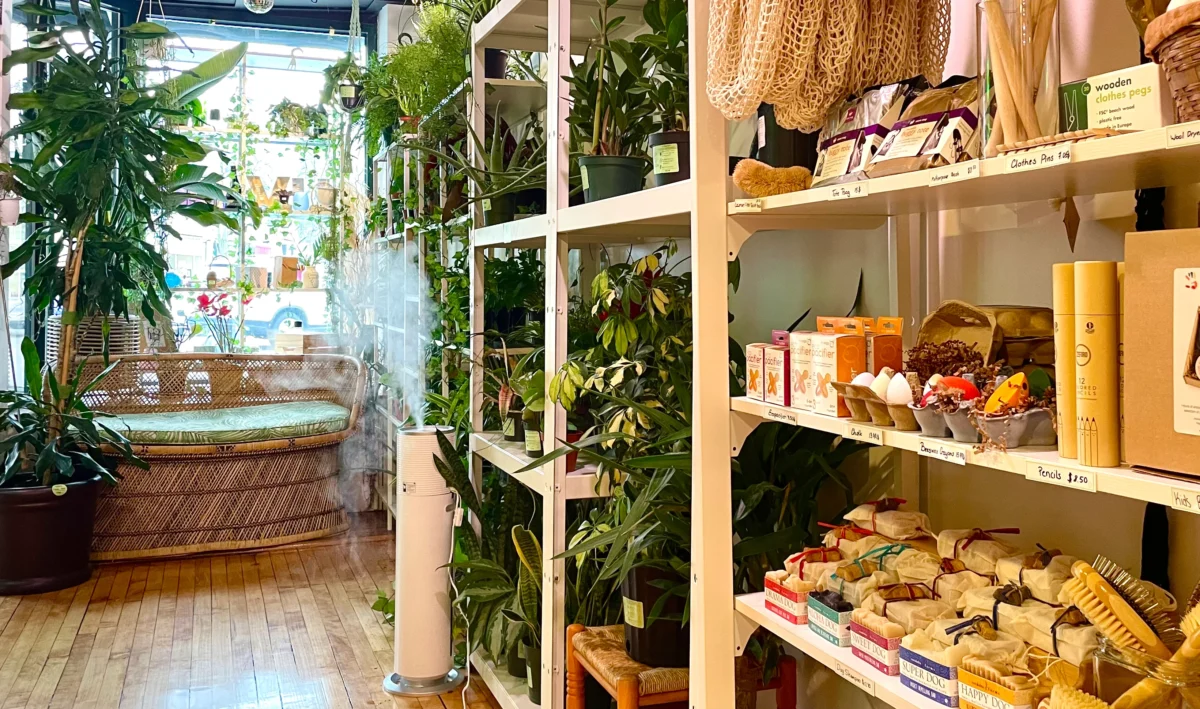Plastic packaging is everywhere and in almost every product sold on the shelves. Walking down the aisles of grocery stores and merchandise retailers, each individually sold item is wrapped and packaged in plastic containers, boxes, and bags—the majority being single-use plastics. By the end of a typical grocery run, the customer walks out with an excessive amount of plastic in their hands—a material that takes nearly 500 years to decompose. Plastic pollutes our environment, breaking down into microplastics that contaminate food and water sources. Plastic pollution and disposable plastics have become one of the most pressing issues, and the rapid increase in production shows that the world is not responding accordingly.
Why do companies continue to use plastic packaging despite its negative impacts? It is simply because plastic is inexpensive and using alternatives costs more money. Many corporations aren’t willing to search for substitutes and make the switch because it is time-consuming and incurs elevated costs. But, with recent social consciousness about individual impacts and news around climate activism, consumers don’t want single-use plastics anymore. Most consumers want to do their part and reduce their impacts on the environment—studies show that “88% of U.S. and U.K. consumers want brands to help them be more environmentally friendly in their daily lives.” But, the continuous usage of plastic by retailers and especially e-commerce stores demonstrates the lack of empathy and understanding of consumers. For instance, “Amazon alone generated an estimated 465 million pounds of plastic packaging in 2019.” Many companies value profits over people and the planet, completely disconnected from the customers’ desires as well as the demands of the earth. With so many large corporations prioritizing profit, are there any companies that commit to the planet and actively reduce their plastic packaging?
Meet UVida. UVida is the first and only zero-waste and refillery store in Boston. The store commits to the health of the planet while promising its customers both sustainability and affordability. UVida translates to “U Life” in Spanish and is an effort for customers to reflect on their consumption and strive to live a more eco-conscious life. UVida started in September 2019 when the founder, Maria Vasco, wanted to continue her passion for environmental science and pursue her dream of opening a zero-waste business. Vasco’s goal is to make it “more of a norm for people to care about the environment in their consumption.” Through the development of accessible alternative products, Vasco is transforming the industry and consumer habits.
What makes UVida’s products unique compared to other items on the market is that there is no plastic packaging or waste. UVida exclusively sells items that are responsibly sourced, produced, and packaged. Zero waste goes beyond recycled materials and compostable sources by considering the entire life cycle of a product from start to finish. UVida sells zero-waste products including reusable cotton rounds, charcoal dental floss, and even eco-friendly pacifiers. Another sustainability initiative is UVida’s refill room, where customers can bring in their own jars and containers and refill them with common household items. This helps to reduce consumption and minimize waste. UVida emphasizes an environmentally conscious approach, establishing a precedent for the future and direction of businesses.
UVida’s products are distinctive and pledge to prioritize the health of our planet. The reusable cotton rounds are completely compostable because they are made with organic cotton and bamboo fabrics with recyclable polyester thread. The more common single-use pads, however, are sold in plastic bags and the cotton isn’t sustainably sourced or derived from recycled materials. The difference between cotton and organic cotton comes down to farming practices. Cotton is a water-intensive crop as it takes about 2,500 liters of water to produce one cotton shirt, compared to organic cotton which requires 91% less water. Additionally, standard cotton uses pesticides and insecticides which intervene with natural biological systems and can contaminate nearby water sources. Opting to use the organic and reusable cotton rounds is the more ethical and sustainable option, minimizing a consumer’s water consumption and supporting regenerative farming practices.
Another featured item is the charcoal dental floss which is packaged in a recyclable box and compostable wax paper. The floss itself is made from bamboo charcoal fiber, which is biodegradable and only takes 60 to 90 days to break down. In comparison, most floss is made with synthetic waxed nylon which isn’t recyclable or biodegradable and takes almost 80 years to disintegrate in a landfill. Dental floss is designed not to tear or break down, so much of it ends up in the ocean as it makes its way through the waste disposal process. This becomes a danger to marine life as it can suffocate animals and cause serious digestive problems. Additionally, standard floss uses plastic containers and is sold in bags and boxes made with even more plastic. To visualize the amount of excess plastic, “if everyone in the United States flossed their teeth as recommended, the plastic containers could fill up a football field six stories high each year.” Understanding and recognizing the exorbitant amount of plastic and its impact on the environment is the first step for consumers to reduce their carbon footprint and consumption.
The next step for consumers is to take action and integrate small adjustments and alternatives in their lifestyles. UVida offers the ability for a person to reduce their individual waste through the refill initiative. UVida’s refill program enables customers to reuse old containers and jars and refill them with household products, such as dish soap, laundry detergent, hair care, body wash and lotion, and even dental care. These items are all organic and sustainable and can be purchased by the ounce, eliminating excessive plastic purchases and encouraging consumers to reuse containers. Laundry detergent tubs, especially, are toxic to the environment as “68% of high-density polyethylene plastic jugs are not properly recycled after being used.” Taking the extra effort to locate a nearby refill store can reduce one’s plastic pollution significantly.
UVida is transitioning towards a more eco-friendly approach, reshaping the market by prioritizing earth through its initiatives. Acknowledging that plastic pollution has become one of the most urgent environmental problems, UVida’s mission is to change consumer behaviors by encouraging people to live a more eco-conscious lifestyle. Bostonians can now reduce their plastic waste by transitioning to UVida’s zero-waste products and reusing containers in the refill room. UVida is an inspiration to all businesses, both small and large, to implement sustainable strategies and provide quality goods for both humans and the earth.
Sources
“10 Shocking Facts about Plastic.” National Geographic, 25 Mar. 2021, https://www.nationalgeographic.co.uk/10-shocking-facts-about-plastic.
Kellogg, Kathryn. “What Is Organic Cotton + Why Does It Matter?” Going Zero Waste, 24 Feb. 2023, https://www.goingzerowaste.com/blog/what-is-organic-cotton/.
Morgan, Blake. “Customers Hate Plastic Packaging, so Why Do Companies Keep Using It?” Forbes, Forbes Magazine, 9 Nov. 2022, https://www.forbes.com/sites/blakemorgan/2021/04/19/customers-hate-plastic-packaging so-why-do-companies-keep-using-it/?sh=697c7532192c.
“Our Story.” Uvida Shop: Boston’s First Zero Waste Store, https://www.uvidashop.com/pages/our-story.
“Why Is Dental Floss Bad for the Environment?” Terra & Co., https://www.terraandco.com/blogs/sustainable-living/why-is-dental-floss-bad-for-the-enviro nment#:~:text=Dental%20floss%20is%20bad%20for,significantly%20contributes%20to%2 0global%20waste.

